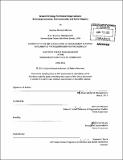Growth strategy for hybrid organizations : balancing economic, environmental, and social impacts
Author(s)
Mamao, Gustavo Moreira
DownloadFull printable version (13.63Mb)
Other Contributors
Sloan School of Management.
Advisor
Jonn Van Maanen.
Terms of use
Metadata
Show full item recordAbstract
Hybrid organizations combine the structure and culture of for-profit companies with the commitment to social good of non-profit organizations. This structure enables them to address social problems in an economically sustainable manner and to capitalize on consumer demand for responsibly-made products. While hybrids must strike a delicate balance to achieve their profit, social, and environment targets, some degree of quantitative growth is necessary in order for them to have the impact they seek and return value to all their stakeholders. Recent literature on hybrid organizations does not focus on the different stages of a company's life-cycle nor does it address the challenges of successfully maintaining a hybrid structure over the course of a company's development. Combining this idea of specific strategic phases with the Hybrid Organization's Sustainability- Driven Business Model presented by Hoffman et a/ (in press, 2011), we can explore economic growth strategies for hybrids while identifying the tensions inherent to or amplified by the hybrid growth process. I built four case studies which identify thirteen tensions experienced as hybrid organizations grow. Based on how these companies addressed the challenge of maintaining economic growth while minimizing mission drift, I concluded that it is possible to maintain triple bottom line values and practices during growth, although there is considerable risk that a company will adopt a more conventional business model. The decision to grow a hybrid organization depends on the goals of the founders, but a strategic partnership with an existent traditional business group was found to be particularly useful as a financial growth strategy. With my thesis, I offer a contribution to practice based on uncovering the root causes of growth tensions for hybrid organizations and a contribution to the literature which builds upon Hoffman's model.
Description
Thesis (S.M.)--Massachusetts Institute of Technology, Sloan School of Management, 2011. Cataloged from PDF version of thesis. Includes bibliographical references (p. 90-93).
Date issued
2011Department
Sloan School of ManagementPublisher
Massachusetts Institute of Technology
Keywords
Sloan School of Management.